See below a copy of an article published in the Australian:
The Optional Protocol to the Convention on the Rights of the Child on a Communications Procedure, has entered into force following its ratification by the required 10 countries Albania, Bolivia, Gabon, Germany, Montenegro, Portugal, Spain, Thailand, Slovakia, Costa Rica). It allows children to complain directly to the UN Committee on the Rights of the Child about alleged violations of their rights.
The new Protocol enables children and their representatives to submit complaints to the Committee on the Rights of the Child about specific violations of their rights under the Convention on the Rights of the Child, as well as under its other two Optional Protocols (on the involvement of children in armed conflict and on the sale of children, child pornography and child prostitution). But children can only complain if their government has ratified the Optional Protocol on a Communications Procedure, and if they have exhausted all legal avenues in their own country.
To learn more about how to submit a complaint, visit: http://www.ohchr.org/EN/HRBodies/TBPetitions/Pages/IndividualCommunications.aspx#OPIC
To learn more about the Optional Protocol to the Convention on the Rights of the Child on a Communications Procedure, visit: http://www.ohchr.org/EN/HRBodies/CRC/Pages/CRCIndex.aspx
Child-friendly publication on the Optional Protocol to the Convention on the Rights of the Child on a Complaints Procedure:
http://srsg.violenceagainstchildren.org/sites/default/files/cropped_images/RaisingUnderstanding_OCPC.pdf
For more information and media requests, please contact
Liz Throssell OHCHR Media Officer – +41 (0) 22 917 9434/ ethrossell@ohchr.org
Miguel Caldeira, OSRSG on VAC – +1 212 824 6763 mcaldeira@unicef.org
World must act on North Korea rights abuse, says UN report
Michael Kirby: “Testimony which tells the stories of the prison camps… of the babies who are born stunted… of the abductions, of the public executions”
The international community must act on evidence of widespread crimes against humanity in North Korea, say the authors of a long-awaited UN report.
A panel of experts mandated by the UN’s Human Rights Council said North Koreans had suffered “unspeakable atrocities” and those accused must face justice.
The panel heard evidence of torture, enslavement, sexual violence, severe political repression and other crimes.
North Korea refused to co-operate and has rejected the report’s conclusions.
Testimony to the panel included an account of a woman forced to drown her own baby, children imprisoned from birth and starved, and families tortured for watching a foreign soap opera.
The UN commission said leader Kim Jong-un had failed to respond to an advance copy of the report, and a letter which warned him he could be held personally responsible for abuses.
Michael Kirby, chairman of the independent Commission of Inquiry, said the report “calls for attention from the international community”.
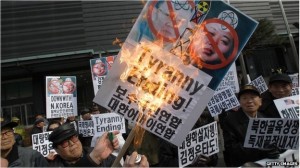 The North’s leaders are frequent targets of angry protests in the South
The North’s leaders are frequent targets of angry protests in the South
“At the end of the Second World War so many people said ‘if only we had known… if only we had known the wrongs that were done in the countries of the hostile forces’,” he said.
“Well, now the international community does know… There will be no excusing of failure of action because we didn’t know.”
“Too many times in this building there are reports and no action. Well this is a time for action.”
‘Unspeakable atrocities’
The BBC’s Imogen Foulkes in Geneva says the report is one of the most detailed and devastating ever published by the United Nations.
Among the reports findings are:
that there is “an almost complete denial of the right to freedom of thought, conscience and religion” in North Korea
there are “entrenched patterns of discrimination”, rooted in the state-assigned class system, which affect every part of life
discrimination against women is “pervasive in all aspects of society”
the state “has used food as a means of control over the population” and had deliberately blocked aid for ideological reasons, causing the deaths of “hundreds of thousands” of people
“hundreds of thousands of political prisoners” have died in “unspeakable atrocities” in prison camps in the past 50 years
security forces “systematically employ violence and punishments that amount to gross human rights violations in order to create a climate of fear”
“In many instances, the violations of human rights found by the commission constitute crimes against humanity,” says the report.
“These are not mere excesses of the state; they are essential components of a political system that has moved far from the ideals on which it claims to be founded.”
It says the UN “must ensure that those most responsible for the crimes against humanity” are held accountable, through a referral to the International Criminal Court, or a UN tribunal.
Responding to the findings, North Korea said it “categorically and totally rejects” the report.
Its response came in a two-page statement sent to Reuters from its diplomatic mission in Geneva.
“The DPRK [North Korea] once again makes it clear that the ‘human rights violations’ mentioned in the so-called ‘report’ do not exist in our country.”
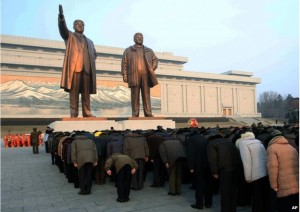 The cult of personality surrounding the Kim family is as strong as ever in North Korea
The cult of personality surrounding the Kim family is as strong as ever in North Korea
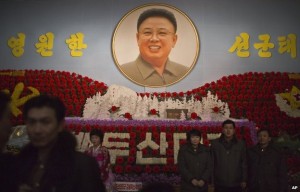 North Korea commemorated the birthday of Kim Jong-il, who died in 2011, on Sunday
North Korea commemorated the birthday of Kim Jong-il, who died in 2011, on Sunday
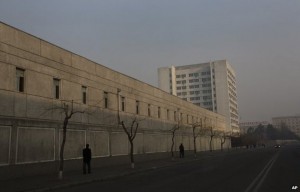 Away from the choreographed celebrations, images showed few people on the streets of Pyongyang
Away from the choreographed celebrations, images showed few people on the streets of Pyongyang
North Korea declined to participate in the panel’s investigation.
Mr Kirby said there was “a very good way to answer the many charges and complaints – and that is to allow the door to be opened” to the international community so they could see the situation for themselves.
For years, North Korean defectors have detailed harrowing accounts of life in the secretive country, with tens of thousands of political prisoners in camps and civilians living under a system of neighbourhood surveillance where they are encouraged to denounce each other.
Although this information has been in the public domain for years, the panel’s inquiry is the highest-profile international attempt to investigate the claims.
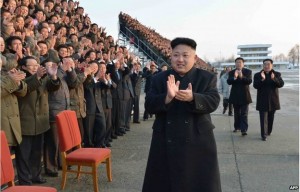 Since Kim Jong-un took over, his regime has threatened nuclear war and conducted a deadly purge
Since Kim Jong-un took over, his regime has threatened nuclear war and conducted a deadly purge
Jared Genser, an international human rights lawyer who has campaigned to stop crimes against humanity in North Korea, said the findings were both ground-breaking and unremarkable.
“They’re ground-breaking in that it’s the first time that the United Nations as an institution has found that crimes against humanity are being committed against the people of North Korea,” he said.
“Of course, it puts a huge burden on the United Nations to then take the next set of steps.
“But of course it’s also unremarkable in the sense that those of us who have worked on North Korea human rights for many, many years are aware of the sheer weight of evidence coming out of North Korea over decades now… And so the real question now is, what next?”
China, North Korea’s only ally, would be likely to block any attempt to refer the North to the International Criminal Court.
And an ad-hoc tribunal, like those set up for Rwanda, Sierra Leone or Cambodia, would appear unlikely without co-operation from elements within the country.
See report: COI DPRK Report 17_02_14_nkorea_unreport
 I was honoured to receive the Paul Harris Award for “Humanitarian Service to Society” at the Rotary International Sydney CBD Branch meeting held on Monday 17 February. On that night Rotary International has celebrated its 109th Anniversary by presenting unsung heroes in the community with Paul Harris Recognitions.
I was honoured to receive the Paul Harris Award for “Humanitarian Service to Society” at the Rotary International Sydney CBD Branch meeting held on Monday 17 February. On that night Rotary International has celebrated its 109th Anniversary by presenting unsung heroes in the community with Paul Harris Recognitions.Today the Australian Human Rights Commission has announced the second inquiry into the human rights of children in immigration detention. See: www.humanrights.gov.au/national-inquiry-children-immigration-detention-2014
Between 2002 and 2004 I as the Australian Human Rights Commissioner have conducted the first inquiry that resulted in a report ‘A Last Resort? National Inquiry into Children in Immigration Detention’ tabled in Parliament on the Budget day 2004. This report found that the mandatory immigration detention of children was fundamentally inconsistent with Australia’s international human rights obligations and that detention for long periods created a high risk of serious mental harm. In response the Howard Government released all children and their families from immigration detention few months later.
Certainly the repetition of my inquiry is the highest form of flattery but timing is very odd. When the boats were arriving in large numbers and Labor was at its peak of cruelty towards the boat arrivals AHRC almost did not see the problem and the newly appointed Children Rights Commissioner was proclaiming that her jurisdiction is limited to domestic matters.
It would be interesting to learn what AHRC jurisdiction is over Manus and Nauru. Also, how its findings will add to the 2004 report’s findings and recommendations. Let’s hope the inquiry is not only a political exercise in consciousness raising but that it will bring a permanent end to the long term immigration detention of children.
My best congratulations to Tim Wilson on being appointed as Australia’s Human Rights Commissioner and to Attorney General Brandis on making this excellent choice. The appointment clearly adds much-needed balance to considerations by the Australian Human Rights Commission (AHRC).
Wilson is the first full-time Australian Human Rights Commissioner to be appointed since December 2005 when I vacated the office. During the six years of Labor government various new positions were created on the AHRC. The budget was significantly increased but the government did not manage to find time to appoint a new commissioner. This reflected Labor’s focus on its view of equity and on anti-discrimination issues and its relative neglect of civil liberties and freedoms. This lack of focus on civil liberties in Australia is further advanced by the fact that despite of numerous inquiries recommending adaption of legislative Bill of Rights for Australia, we are the only western democracy with no Bill of Rights to protect our fundamental freedoms.
During the Labor years the AHRC failure to protect our freedoms became especially evident. AHRC was either missing in action or advocating further curtailment of civil liberties in Australia. The AHRC decision to provide no amicus curie presence in the Bolt case is a good example of being missing in action. The advocating of additional limitations on our freedoms reached its peak when the AHRC decided to support Attorney-General Nicola Roxon’s plan to amend the Racial Discrimination Act to outlaw words that may offend, and by its failure to act when the Labor Government planned to create statutory media regulation in response to Finkelstein Inquiry. Further, the AHRC argued in its 2012 submission to the Senate Legal and Constitutional Committee about Human Rights and Anti-Discrimination Bill for the abolition of the Australian Human Rights Commissioner position.
The Commissioner’s position is vital to the protection of our freedoms and the development of a human rights culture. It is a statutory position that is independent – it does not report to the Attorney General or take Government direction but it reports directly to the Australian Parliament. The Commissioner’s mandate is guided by the International Covenant on Civil and Political rights. It has also an important public educational role that is too readily overlooked.
Civil liberties and freedoms, and in particular freedom of speech, play a very important role in modern society, adding to innovation, eliminating costly mistakes and giving modern societies their competitive edge. One characteristic of freedom of speech is that it sometimes may allow incorrect information to enter the public domain and this, of course, may hurt feelings of some. But there is no right not to be offended. Indeed, freedom to offend can go hand in glove with freedom of speech. Should astronomer Copernicus have refused to publish his heliocentric theory simply because he feared offending the Church and badly undermining the feelings of Catholics at the time? Progress might often depend on one person risking to offend by advancing an idea that proves to be right. Progress might often depend on one person risking to offend by advancing an idea that proves to be right.
The only exception to freedom of speech should be when it calls for action that could result in violence, for example against people of certain social classes or racial or religious backgrounds and when it threatens national security and public safety.
Coming back to the appointment of Tim Wilson, scores of left-leaning commentators have criticised the decision and pointed to Tim’s libertarian views and his employment at the Institute of Public Affairs. The prevailing wisdom amongst the critics is that to be appointed to the AHRC, or to work there, one must adhere to a left wing vision of the world and come from an “approved” Labor background. Most of current commissioners came from Labor or social welfare backgrounds. Too many of the supporters of those appointees fail to recognise that organisations like the Institute of Public Affairs, or people who share non-Labor outlooks, are a legitimate part of our civil society, entitled to participate fully in the political processes. The former Soviet Bloc countries provide good illustrations of the consequences of excluding large segments of society from these processes. To put it simply – we need all rights protected, even those of conservatives.
If we are to have a human rights commission, there must be a balance of views and outlooks on that Commission. Let’s hope that the appointment of Tim Wilson will be an important step to advance such a balance.
The NSW is finally considering a bill to stop Australian patients to go overseas to buy trafficked organ for transplant. The person purchasing a harvested for sale organ overseas will face a jail term of up to 25 years under a bill to go before NSW Parliament early next year.
In 2007 Canadians David Matas and David Kilgour published “Revised Report into Allegations of Organ Harvesting of Falun Gong practitioners in China” – see http://